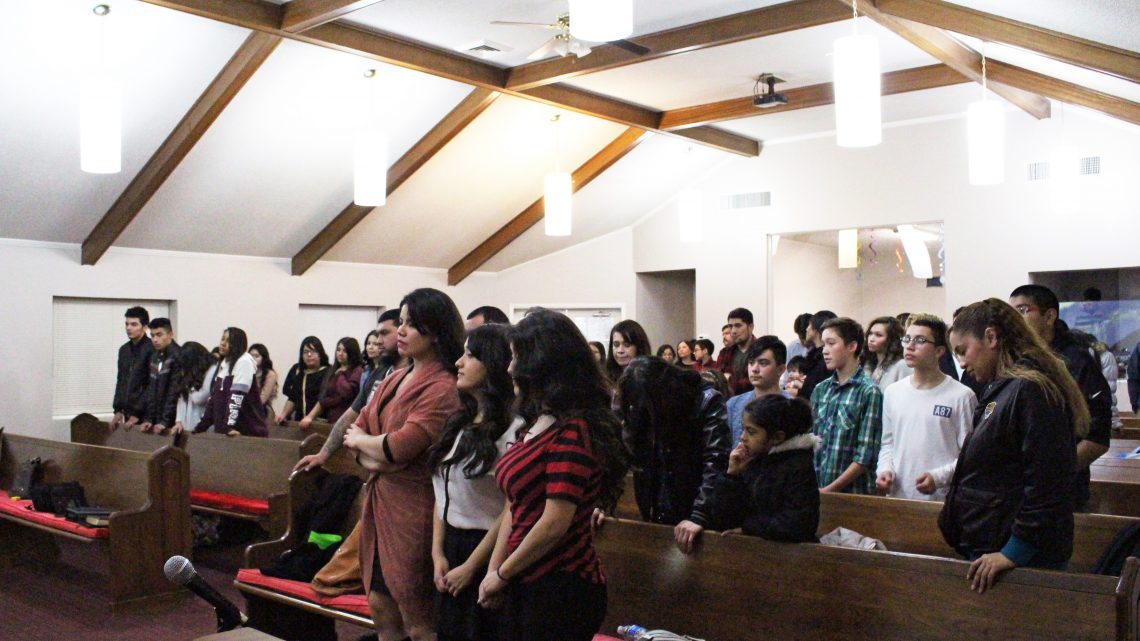Lesson for May 19-25, 2018
Although the three angels’ messages in Revelation 14 have been mentioned in several of our lessons this quarter, this week we will begin to explore them more deeply. These messages, which are obviously given in the last days, have come to be known by Adventists as “present truth”, or information that is crucial for the particular time in which we are living. See 2 Peter 1:12.
- For Adam and Eve, for example, their present truth consisted of a Seed that would someday defeat Satan (Genesis 3:14).
- Present truth for Noah would have been that the worldwide flood was coming (Genesis 6:13).
- Abraham was given the promise of being the start of a great nation through which the world would be blessed (Genesis 18:18)
- For John the Baptist, present truth was to repent and be baptized because a Messiah was born and was about to begin His ministry (Luke 3:16).
You get the idea. God progressively unfolds truth to us as we are able to understand and act on it.
The first angel (in Revelation 14:6, 7) basically tells us to worship the Creator. Along with that message is a warning about His judgment. Both roles of God, Creator and Judge, will have special meaning for us in the end time. We begin to understand why this is necessary for a full understanding of the plan of salvation that is unfolding before us.
Focus Text: “Then I saw another angel flying in the midst of heaven, having the everlasting gospel to preach to those who dwell on the earth–to every nation, tribe, tongue, and people.” Revelation 14:6 NKJV
The gospel has never changed; it remains everlasting. But at no time will it ever be preached with such fervor and enthusiasm as it will be in the last days. Jesus gave His disciples a similar directive in His “Great Commission”: to go, teach, and baptize all nations (Matthew 28:19). And what an impetus this gave to the beginning of the Christian church.
Some have called the first angel’s message the same as the “Great Commission”. Indeed, they sound like one and the same, in content and scope. This causes us to believe that a major task awaits God’s people in the times in which we are now living: the task of spreading the gospel until the whole world has heard of our wonderful Creator and Judge.
Sunday: The Universality of the Gospel
There are similarities between the first angel’s message and Christ’s Commission for His disciples to preach to all nations. But the verse that ties these together is Matthew 24:14, which says…
“And this gospel of the kingdom will be preached in all the world as a witness to all the nations, and then the end will come.” NKJV
As they saw the gospel quickly spreading following Christ’s death, what hope it must have given them that His Second Coming was soon to follow. But the timing is in God’s hands. And we must now expect another rapid evangelistic movement that will encompass global achievements through God’s Holy Spirit in these last days.
We may wonder why the whole world must be reached, but these verses help us see God’s global mission. They tell us…
“But the Scripture has confined all under sin, that the promise by faith in Jesus Christ might be given to those who believe.” Galatians 3:22 NKJV
“For God has committed them all to disobedience, that He might have mercy on all.” Romans 11:32 NKJV
Yes, sin has impacted us all, and God is anxious for all to be prepared for the end of the world. It sounds like an event like no other, and God, in His mercy, wants His children to have every opportunity to be ready and to be saved.
“The Lord is not slack concerning His promise, as some count slackness, but is longsuffering toward us, not willing that any should perish but that all should come to repentance.” 2 Peter 3:9 NKJV
Discussion Questions:
Read Revelation 14:6 and Matthew 28:19. Compare preaching the everlasting gospel with making disciples. How do these tasks differ, and how are they the same?
Read Galatians 3:22 and Romans 11:32. How do these verses show us why the whole world must be reached? Why is the Holy Spirit especially needed worldwide after Christ’s resurrection and again at the end of time?
Read 2 Peter 3:9 and Acts 1:14. What seems to cause a delay in the Lord’s Coming? What did the disciples do to receive an infilling of the Spirit at Pentecost?
Monday: The Thief on the Cross and the “Everlasting Gospel”
Just as the thief on the cross next to Jesus was reached with the everlasting gospel and was assured of his salvation, there will be many who will be reached at the last minute, just prior to the Second Coming. God is undoubtedly working on the hearts of many right now, whom we would not expect to be saved. They are just like that thief on the cross, who, along with the crowd, had previously been cursing Jesus (Matthew 27:44).
Nothing compares with the gospel message. To know that we are loved by God, that we will someday be with Him in paradise, is the sweetest message anyone could communicate to another human being. We should never be hesitant or ashamed to deliver that good news to anyone. As a matter of fact, we should desire to share it with everyone! And this is exactly what God expects of His followers, no matter what age we live in. People have needed God at the beginning of the world, at the end, and for all the time in between.
Discussion Questions:
Read Revelation 14:6 and Luke 23:32, 33, 42, 43. What was the everlasting gospel (good news) to the thief on the cross?
Read Matthew 27:44. What may have changed the mind of one of the thieves, who both had been cursing Jesus previously, along with the crowd?
Read Ephesians 2:12. Why does the world need the everlasting gospel, especially in the last days?
Tuesday: Fear God and Give Him Glory
We have all wondered what it means to “fear” God. In both the Hebrew and Greek, this word, when referring to God, means to have reverence for Him, rather than to be afraid of Him. Strong’s Concordance defines “reverence” as having a feeling of deep respect, love, awe, and esteem. This idea of fearing God and having reverence for Him is summed up in the verse…
“God is greatly to be feared in the assembly of the saints, And to be held in reverence by all those around Him.” Psalm 89:7 NKJV
When we have true reverence for God and who He is, the part of giving Him glory comes naturally. Because God has delivered us and shown us such mercy, we find ourselves glorifying Him by our praise, character, service, and even sometimes by our suffering.
- praise–“Whoever offers praise glorifies Me…” Psalm 50:23 NKJV
- character–“By this is My Father glorified, that you bear much fruit…” John 15:8 NKJV
- service–“…If anyone ministers, let him do it as with the ability which God supplies, that in all things God may be glorified…” 1 Peter 4:11 NKJV
- suffering–“Yet if anyone suffers as a Christian, let him not be ashamed, but let him glorify God in this matter.” 1 Peter 4:16 NKJV
All these ways of glorifying God are linked to our obedience, to doing what is right. Therefore, we must claim God’s righteousness to be our own, in order for this to happen. That is why showing God reverence is first necessary for true obedience that leads to God’s glorification. Anything we do or say as a Christian is a mere reflection of God’s character.
Solomon had the right idea when he said…
“Let us hear the conclusion of the whole matter: Fear God and keep his commandments: For this is the whole duty of man.” Ecclesiastes 12:13 KJV
When we reverence God and keep His commandments, we are giving God glory.
Discussion Questions:
Read Revelation 14:7, 12 and Ecclesiastes 12:13, 14. How are these verses similar? What do they tell us about God’s people at the end of time?
Read Deuteronomy 6:1, 2 and Matthew 5:19. Why is it important to keep God’s commandments, all of them, and how does this show our reverence to God?
Read Psalm 50:23 and Galatians 6:16. Which is more important in showing our praise to God–the type of music presented to Him, or our conduct and attitude toward God and others? Who is the ultimate judge of whether our praise measures up to God’s standards?
Wednesday: The Hour of His Judgment Has Come
The second part of the first angel’s message calls our attention to the judgment. Although the judgment is a scary thought to most of the world, to God’s redeemed and forgiven ones, it is actually a welcome relief. It signifies that justice is being accomplished in the universe, and that our suffering at the hands of evildoers is about to be over. The victims of crime are never disappointed when God is the Judge.
Despite our joy at knowing justice is being served in the heavenly courts, God’s people must remain solemn and faithful to our calling. When we are “washed”, “sanctified”, and “justified” (as it says in 1 Corinthians 6:11), we can know “there is therefore now no condemnation” for us (Romans 8:1). Jesus pleads our case and defeats our accuser, Satan, by the mighty arguments of His death at Calvary.
Discussion Questions:
Read Matthew 12:36, Psalm 62:12, and 1 Corinthians 4:5. On what three things are we judged by God?
Read Romans 8:1 and 1 Corinthians 6:11. What does it mean to be “in Christ Jesus”? How are we sanctified and justified?
Read 1 Thessalonians 5:2-8 and Ephesians 6:16, 17. Why should God’s judgment not come as a surprise to God’s people? With what should we arm ourselves for this event?
Thursday: Worship the One Who Made the Heavens and Earth
The call to reverence God, our Judge, is followed by a call to worship Him as our Creator. In a world that will have largely forgotten the first four of God’s Ten Commandments, we are given a reminder once again of who created us in the first place. When we remember to keep the seventh day holy, we remember not to worship any other gods, not to make idols to them, and not to use God’s name in vain.
The Sabbath day, set aside for the purpose of getting to know God better, deserves our full attention in the last days. It is the only way we can achieve a meaningful relationship with Him, as the end draws nearer to the Second Coming. The Sabbath, meant to be a sign of our devotion to our Creator, therefore must play a major part in our worship. It alone points us to the Creator, the One who created the heavens and the earth.
The reason this first angel’s message even exists is pointed out in the messages of the second and third angels:
- The second angel warns us of spiritual apostasy (called Babylon) that confuses us about the true character of God.
- The third angel warns us of spiritual delusions (called the beast and his image) that divert our worship from God.
Discussion Questions:
Read Revelation 14:6, 7 and Exodus 20:8, 11. Why does God call us back to His creatorship in the end times, and why is the Sabbath His chosen vehicle for doing this?
Read Revelation 11:17, 18. How has the earth been destroyed by man, and why is this a sin against God? How is our worship affected by understanding God’s role as Creator and Judge?
Read Revelation 14:8, 9. How are the second and third angels’ messages tied to our worship? Why is worship to God revealed first in the first angel’s message, and how will this protect us from the faulty worship described by the following angels?
Summary
This week the focus was on the first angel’s message…
- how it is to reach the whole world (Sunday)
- what is the everlasting gospel (Monday)
- what does it mean to fear God and give Him glory (Tuesday)
- what does the judgment mean for us (Wednesday)
- in what ways do we worship our Creator (Thursday)
Final Words
Some speculation is evident when it comes to the “fountains (or springs) of waters” mentioned in the first angel’s message. The traditional elements of Creation include only the heavens (or sky), the earth, and sea. The fourth commandment mentions only the “heavens and the earth, the sea, and all that is in them” Exodus 20:11 NKJV
- Could the fountains of waters be referring to the great flood of Noah’s time–a time of judgment upon the world? Genesis 7:11 says, “…on that day the fountains of the great deep were broken up, and the windows of heaven were opened.” NKJV
- Or could it also point to the New Jerusalem? “for the Lamb who is in the midst of the throne will shepherd them and lead them to living fountains of waters. And God will wipe away every tear from their eyes.” Revelation 7:17 NKJV
Revelation 22:17 tells us more about this living water: “And the Spirit and the bride say, ‘Come!’ And let him who thirsts come. Whoever desires, let him take the water of life freely.”
Thankfully, Jesus offers us this living water now. The promise of eternal life can be ours for the asking. He told the woman at the well, “…whoever drinks of the water that I shall give him will never thirst. But the water that I shall give him will become in him a fountain of water springing up into everlasting life.” John 4:14 NKJV
This inclusion of “the fountains of waters” is vital, because in addition to seeing our God as Creator and Judge, we must remember that He is also our Redeemer, the Lamb who was slain, who gives us the right to eternal life. Yes, our worship includes Jesus. Paul predicted that someday “every knee should bow…and every tongue confess that Jesus Christ is Lord…” Philippians 2:10, 11 NKJV
Jeremiah 2:13 holds a further thought about this “fountain of living waters”. It appears man has tried to create his own. This is true on many fronts, including the substitution of a day of worship…
“For My people have committed two evils: They have forsaken Me, the fountain of living waters, and hewn themselves cisterns–broken cisterns that can hold no water.” NKJV
How are we worshiping our wonderful Lord and Savior today? He deserves our full commitment and service. What a difference a daily surrender to Him makes in our lives!
Next Week’s Lesson: End-Time Deceptions
To read the Sabbath School Lesson Quarterly or see more resources for its study, go to https://www.absg.adventist.org/
All Outlook blogposts by Teresa Thompson, are at http://outlookmag.org/author/teresathompson/









